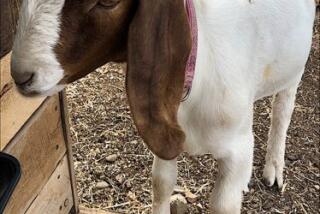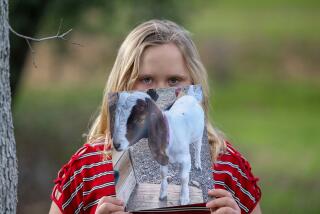Animal rights group alleges UC Irvine negligence led to six research animal deaths

An animal rights group is alleging that UC Irvine researchers failed to properly administer anesthesia and provide adequate veterinary care to six research animals last year, leading to the deaths of four rabbits, a pig and a sheep.
Michael A. Budkie, executive director of Stop Animal Exploitation Now, is urging the U.S. Department of Agriculture to investigate the deaths as violations of federal animal welfare laws. If the violations are confirmed, he said, federal regulators should impose the maximum fine of $10,000 per animal on UCI.
“There are serious ethical issues here because we’re talking about vertebrate animals with central nervous systems, which means they are intelligent, sensitive animals capable of feeling pain,” Budkie said Tuesday. “Even if people aren’t concerned about animals, they should be concerned because the majority of animal research is federally funded.”
A UC Irvine statement called the allegations “flatly inaccurate.” It said university researchers did not negligently kill any animals, fail to provide appropriate care or procedures, or violate any regulations overseeing the use of animals in research.
University spokesman Tom Vasich said Department of Agriculture officials reviewed the reports of the animal deaths this year but found no regulatory violations. The animals were being used to study heart valves, imaging technology and improvements in treating burns and in corneal surgery, he said.
”Our responsibility to the animals in our care is taken extremely seriously,” the statement said. “We are committed to their humane treatment and respect their important role in saving the lives of our friends, family and fellow human beings worldwide.”
UCI received $130 million in funding for animal research from the National Institutes of Health during the last fiscal year.
Budkie released reports sent by UCI researchers to an internal university committee that oversees the animal research program.
The first report — in March 2017 — said three rabbits had died shortly after arrival at UC before they were used in any research and that they were ultimately diagnosed with an intestinal condition that caused diarrhea and death.
Researchers reported the next month that a pig had died suddenly while under anesthesia and that a sheep had died unexpectedly after an operation because of internal bleeding likely caused by a “disproportionate” dose of heparin, a blood thinner.
The last report — in August 2017 — said a rabbit had died immediately after being injected with a ketamine/xylazine anesthetic cocktail.
Budkie’s Ohio-based watchdog group seeks an end to animal experimentation and monitors research programs at more than 1,000 private and public laboratories across the country. Technological developments, he said, have created cheaper, safer and more effective research methods, such as computer simulations and 3D bioprinting.
Vasich said UCI aims to use non-animal research whenever possible and uses live, vertebrate animals only when scientifically justified. But many research projects, including those concerning drug development and advances in surgical techniques, require testing on animals before moving to human clinical trials, he said.
Twitter: @TeresaWatanabe
More to Read
Start your day right
Sign up for Essential California for news, features and recommendations from the L.A. Times and beyond in your inbox six days a week.
You may occasionally receive promotional content from the Los Angeles Times.







